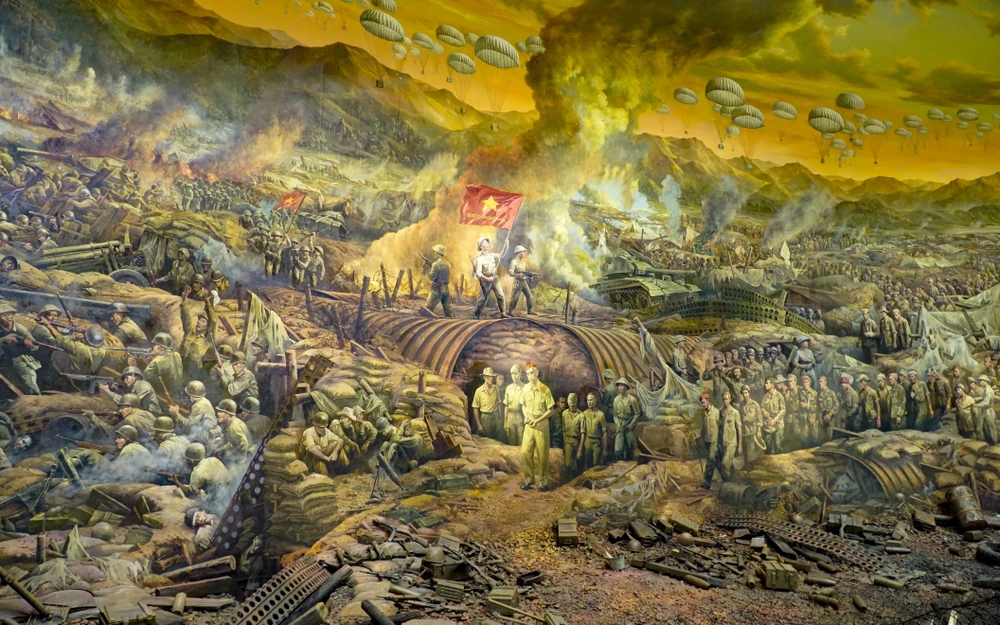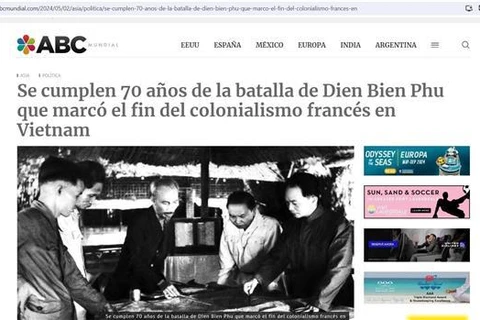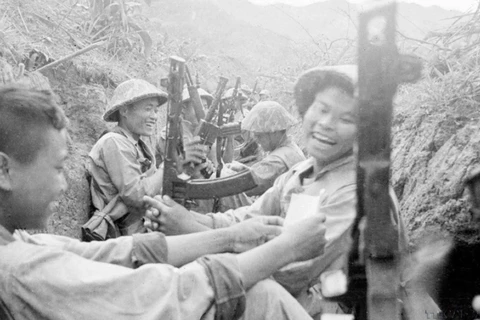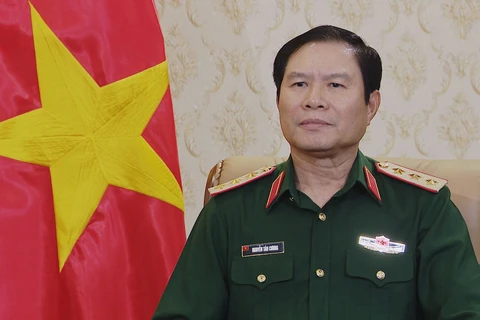
Hanoi (VNA) – Exactly 70 years ago, Vietnam won the Dien Bien Phu campaign, forcing the French government to sign the Geneva Agreement in July 1954 and marking the end of the French military presence not only in Vietnam but also in the whole Indochina.
The spirit of solidarity, self-reliance, the great leadership, the will to fight, and the determination to win, from the Dien Bien Phu victory are remembered today, giving more strength to Vietnam to firmly go forward on the path that late President Ho Chi Minh and the Communist Party of Vietnam have chosen.
Memories of a painter who grew up with stories about Uncle Ho, General Giap
We came to see painter George Burchett when he was working to digitalise his father’s writings that highlight a very important period of Vietnam history when the country was in fierce fighting against the French.
Burchett’s house in Hanoi is filled with artworks, a lot of which are artefacts that bear the traces of his personal memories of the Vietnamese war stories told by his father, late Australian reporter Wilfred Buchett, who accompanied Vietnamese soldiers throughout the country’s two resistance wars against foreign invaders.

The painter said his siblings and himself grew up with stories of Uncle Ho, General Vo Nguyen Giap, the Dien Bien Phu victory and the Vietnamese people’s heroic struggle for national independence and unity, which have embedded in them profoundly.
His father’s documentaries and stories about war hot spots from the north to the south of Vietnam helped him understand about the history, war and peace in the Southeast Asian nation.
Recalling his father talks with Uncle Ho in Thai Nguyen province in March 1954 when his father asked Uncle Ho about Dien Bien Phu, George said that Vietnam’s late President Ho Chi Minh explained to his father complicated things in a very simple way.

“Uncle Ho took off his sun helmet, turned it upside down and said this was Dien Bien Phu, a valley. At the bottom of the valley is the best of the French army. The valley is surrounded by mountains. And we are there and the French will never get out.”
Just by that simple way Uncle Ho was able to rally all the people, and that was how Vietnam won the battle, Burchett said.
The wide anti-war movements then also had an important role to play in completing annihilation of the French aggressive expeditionary force, he said, and that the global imperialist power with the strongest army and support from its ally could not overpower the Vietnamese people’s great will and desire for unification, independence and freedom.
Showing us a picture of his father in Vietnamese outfit visiting a revolutionary base in the north, he said international peace-lovers like his father contributed their voice, calling for the world to support Vietnam.
“Right after the meeting with President Ho Chi Minh, my father sent his first cable to the world, in which he expressed his firm belief that Vietnam would win the Dien Bien Phu battle” Burchett said.
“The action now taking place at Dien Bien Phu is the most tragic failure for French arms in the whole disastrous fiasco of the Navarre Plan to crush the people of Vietnam”, George read his father’s lines.
My father felt very proud to be part of the world’s movement to support Vietnam to win the heroic battle for independence, liberty and union.
People’s war key to Dien Bien Phu victory: scholars

In a similar vein, Carl Thayer, Emeritus Professor at the University of New South Wales (Canberra), told Vietnam News Agency that the Dien Bien Phu campaign proved the efficacy of the people’s war through mobilisation of the whole population to oppose foreign aggression.
In his letter sent to soldiers on March 11, 1954, then President Ho Chi Minh said the fighting against French was very difficult but also very glorious. He expressed his firm belief that the soldiers would bring into play all the accumulated will and strength to overcome hardship and fulfill their glorious duty to the nation.
During the Dien Bien Phu Campaign, tens of thousands of people engaged in transporting food supplies to the front or building the road for moving the artillery to the battle. Thayer said a regular armed forces supported by military assistance from fraternal countries was also a very important factor in Vietnam’s Dien Bien Phu victory.




Meanwhile, in an interview with Vietnam News Agency, Professor Piere Aselin from Hawaii Pacific University, USA held that the Dien Bien Phu Campaign from March 13 to May 7, 1954 demonstrated the importance of working together and acting together to gain independence.

“As a historian, I see one of the keys to victory was the leadership and the organisation. There was always a very high level of discipline within the Communist Party and the armed forces”.
It is not easy to get men, women, ethnic minority groups, Catholics and Buddhists to come together but the Vietnamese Party and President Ho Chi Minh were able to do so very well, he said.
Aselin said General Vo Nguyen Giap was a military genius and that his strategic ability and astute tactics helped Vietnam win the war against the invader whose resources were much bigger than those of his peasant army. Giap changed the theme of the Dien Bien Phu contest when the battle had already begun.

“At first, it had been his intention to get it over quickly and orders were issued accordingly. However, he thought it through, decided he could not afford to take chances, rapid attack would not guarantee complete success, and that’s why he shifted the guiding principle to “advance cautiously, strike surely”.
Today in Vietnam, you talk a lot about bamboo diplomacy and I really think General Giap applied his bamboo strategy in the battle that helped the peasant army defeat the colonists.
Seventy years have passed, Vietnam has shone bright as a country of peace, bliss and robust development. It has carved out significant achievements with its bamboo diplomacy, in which it stays steadfast and unyielding on basic principles but flexible in the ways and means to achieve strategic objectives, Professor Thayer said.
As for painter Burchett, who is half Australian and half Bulgarian but always identifies himself as Vietnamese, he has chosen living for good in Vietnam, the place where he was born. He’s busy with digitalising and archiving his father’s journalistic stories, photos and documentaries because he knows it’s so important for future generations to learn about the wars and the historic victories of Vietnam./.






















